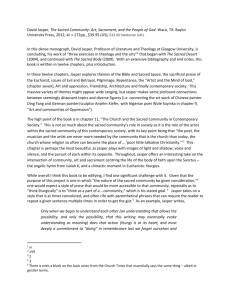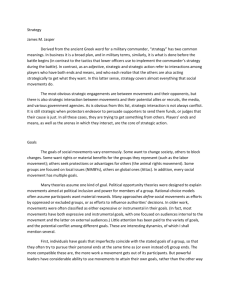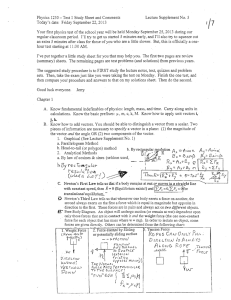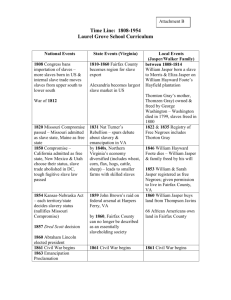Culture, Emotions, and Social Movements
advertisement
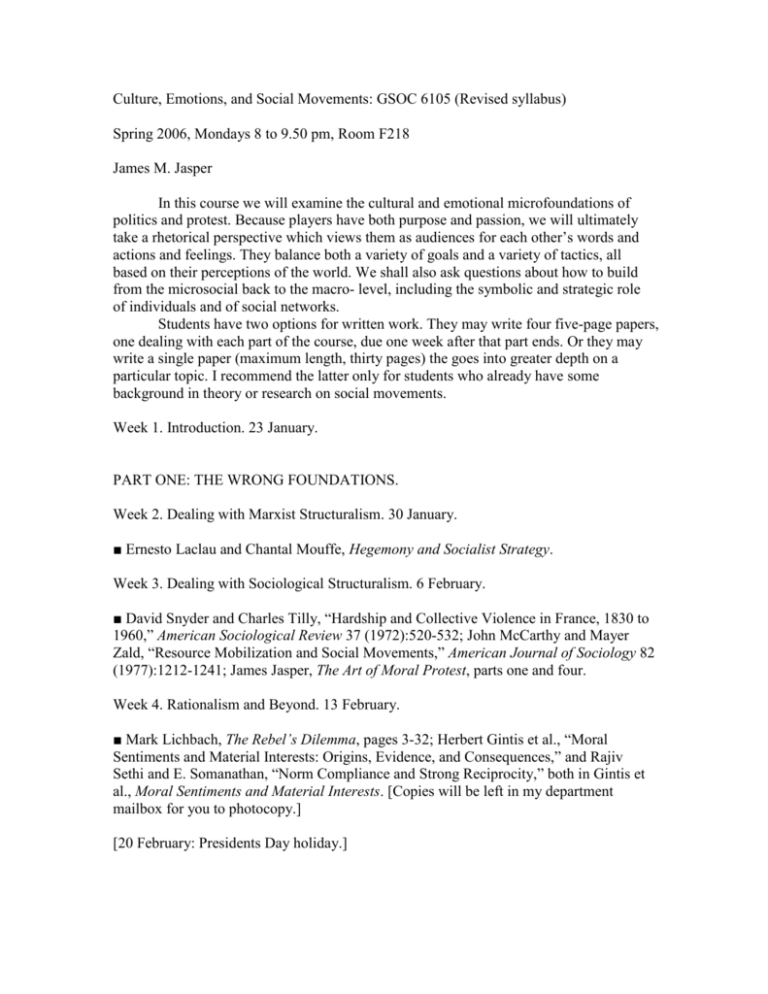
Culture, Emotions, and Social Movements: GSOC 6105 (Revised syllabus) Spring 2006, Mondays 8 to 9.50 pm, Room F218 James M. Jasper In this course we will examine the cultural and emotional microfoundations of politics and protest. Because players have both purpose and passion, we will ultimately take a rhetorical perspective which views them as audiences for each other’s words and actions and feelings. They balance both a variety of goals and a variety of tactics, all based on their perceptions of the world. We shall also ask questions about how to build from the microsocial back to the macro- level, including the symbolic and strategic role of individuals and of social networks. Students have two options for written work. They may write four five-page papers, one dealing with each part of the course, due one week after that part ends. Or they may write a single paper (maximum length, thirty pages) the goes into greater depth on a particular topic. I recommend the latter only for students who already have some background in theory or research on social movements. Week 1. Introduction. 23 January. PART ONE: THE WRONG FOUNDATIONS. Week 2. Dealing with Marxist Structuralism. 30 January. ■ Ernesto Laclau and Chantal Mouffe, Hegemony and Socialist Strategy. Week 3. Dealing with Sociological Structuralism. 6 February. ■ David Snyder and Charles Tilly, “Hardship and Collective Violence in France, 1830 to 1960,” American Sociological Review 37 (1972):520-532; John McCarthy and Mayer Zald, “Resource Mobilization and Social Movements,” American Journal of Sociology 82 (1977):1212-1241; James Jasper, The Art of Moral Protest, parts one and four. Week 4. Rationalism and Beyond. 13 February. ■ Mark Lichbach, The Rebel’s Dilemma, pages 3-32; Herbert Gintis et al., “Moral Sentiments and Material Interests: Origins, Evidence, and Consequences,” and Rajiv Sethi and E. Somanathan, “Norm Compliance and Strong Reciprocity,” both in Gintis et al., Moral Sentiments and Material Interests. [Copies will be left in my department mailbox for you to photocopy.] [20 February: Presidents Day holiday.] PART TWO: CULTURE Week 5. Touraine. 27 February. ■ Alain Touraine, article from Social Research 1985. Week 6. Carriers of Meaning. 6 March. ■ T. V. Reed, The Art of Protest, selections; Jasper, The Art of Moral Protest, chapters 6, 7. Week 7. Global Culture and Strategic Appeals. 13 March. ■ Clifford Bob, The Marketing of Rebellion. [20 March: spring break.] Week 8. Distinguishing Culture from Strategy. 27 March ■ Margaret Archer, Culture and Agency PART THREE: EMOTIONS Week 9. Emotions as Motivation. 3 April ■ Jasper, The Art of Moral Protest, chapters 5, 8, 9; Jasper, “Motivation and Emotion,” in Goodin and Tilly, The Oxford Handbook of Contextual Political Analysis; Jeff Goodwin, “The Libidinal Constitution of a High-Risk Social Movement,” American Sociological Review 62 (1997):53-69. Week 10. Dignity and other Emotional Accomplishments. 10 April. ■ Elisabeth Jean Wood, Insurgent Collective Action and Civil War in El Salvador. Week 11. Brainwashing and other Tricks of Solidarity. 17 April. ■ Janja Lalich, Bounded Choice: True Believers and Charismatic Cults. PART FOUR: DILEMMAS AND DECISIONS: PUTTING THE PIECES TOGETHER? Week 12. Strategy. 24 April. ■ Marshall Ganz, “Resources and Resourcefulness,” American Journal of Sociology 105 (2000):1003-1062; Jasper, “A Strategic Approach to Collective Action,” Mobilization 9 (2004):1-16; David Cunningham, There’s Something Happening Here: the New Left, the Klan, and FBI Counterintelligence. [1 May: holiday] Week 13. Networks. 8 May. ■ Bert Klandermans and Dirk Oegema, “Potentials, Networks, Motivations, and Barriers: Steps Towards Participation in Social Movements,” American Sociological Review 52 (1987): 519-531; Roger Gould, “Why Do Networks Matter,” and Ann Mische, “CrossTalk in Movements,” both in Mario Diani and Doug McAdam, Social Movements and Networks. [Copies of these will be in my department mailbox for you to photocopy and return.] Week 14. Individuals, Symbolic and Decisive. Date to be decided. ■ Mario Diani, “’Leaders’ or Brokers?” In Diani and McAdam; more to come.
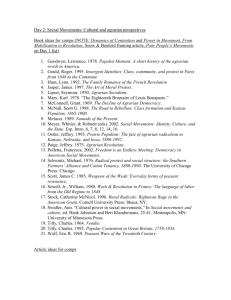
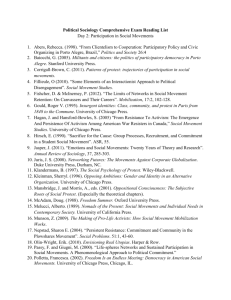

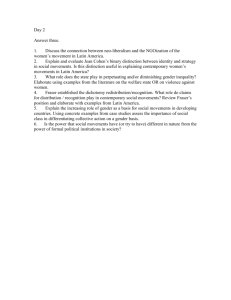

![The Politics of Protest [week 3]](http://s2.studylib.net/store/data/005229111_1-9491ac8e8d24cc184a2c9020ba192c97-300x300.png)

